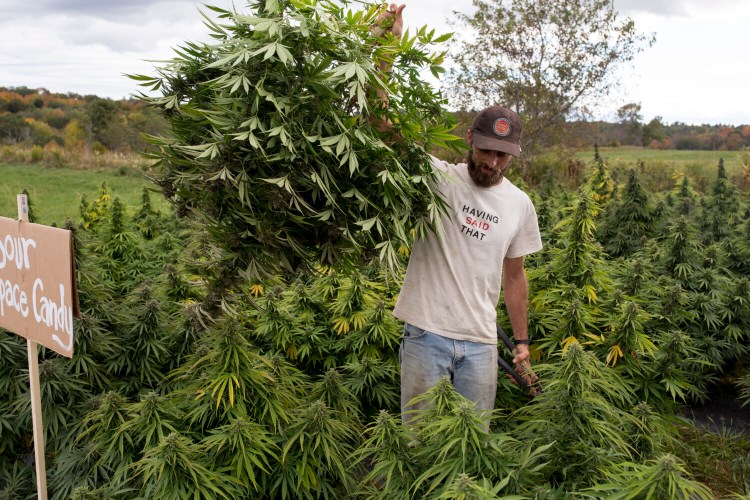Taryn and Ben Marcus thought they had done everything right.
When Maine legalized industrial hemp cultivation, the Whitefield farmers applied for a license from the state. They researched the best growing practices, planted their crop and weeded it by hand. Then they promoted their enterprise, Maine’s first pick-your-own hemp farm, creating a market.
“We basically did what good farmers do,” Taryn Marcus said. “We grew a beautiful crop.”
But doing everything right was not enough. The couple’s bank and insurance company informed them that their accounts had been canceled, because they don’t have any guidance from the U.S. Department of Agriculture on how to do business with farmers who grow a product that used to be illegal. Despite following the letter of the law, the Marcuses could lose their farm and their home thanks to bureaucratic slow-walking in Washington.
This is the kind of thing we have come to expect in relation to marijuana — a cousin of the hemp plant that contains the psychoactive chemical THC. Marijuana is a prohibited drug under federal law, but is now legal in 33 states for medical use, adult recreational use or both.
Polls show that marijuana legalization is popular among Americans and is routinely passed at referendum on the state level when voters get a chance. But gridlock in Washington has left us with a tense cease-fire, where federal authorities are not prosecuting businesses that operate in states where it’s legal. It is an industry that is ready to take off in Maine, when legal sales are expected to begin next year.
But hemp is different. It was made legal under the federal farm bill of 2018, and, unlike marijuana, it doesn’t get anyone high. The No. 1 product made from hemp these days is CBD oil, which you can legally buy as a dietary supplement in health food stores and gas stations all over the country. Additionally, hemp seeds are considered a “super food,” loaded with protein and healthy fats. Hemp fiber can be made into textiles, rope, paper and building products.
Maine legalized hemp as a commercial crop in 2015, and the state began issuing licenses the following year.
It’s an outrage that famers like the Marcuses, who followed the law and received guidance from the state, should risk losing everything by getting involved in this totally legal industry.
We are happy to see that Gov. Janet Mills and Maine Agriculture Commissioner Amanda Beal have written to the USDA prodding the agency to hurry up and issue the regulations. But it’s time the law was brought up to date with reality.
The Secure and Fair Enforcement Banking Act, or SAFE Banking Act, which has passed in the U.S. House of Representatives, would take the problem on more directly. It allows cannabis-related businesses, including hemp and marijuana, access to traditional banking.
Businesses operating under the law should not be treated like criminal operations. People like the Marcuses are doing all the all the right things, and Congress should, too.
Send questions/comments to the editors.


